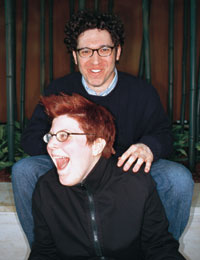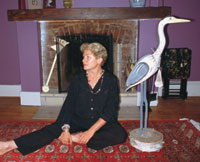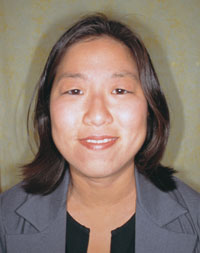25 NEW FACES OF INDEPENDENT FILM 2002
 |
| PHOTO: MIGUEL VILLALOBOS |
16/17 M. Stark & Jacob MeszarosM. STARK AND JACOB MESZAROS met in 1996 while they were both attending UCLA. Stark was an undergraduate studying film and television and Meszaros was finishing his MFA in screenwriting and was awarded the Marty Klein Comedy Writing Award. They made a couple of digital shorts together and quickly found out that opposites do, in fact, attract – as they are now living and working together.
"We are a very odd couple because our tastes are so different," says Stark." Strangely enough it keeps us balanced," Jacob adds. "I am so associative and can be easily distracted and M. is very precise and logical – we actually work really well together."
While attending school, Meszaros won the Academy of Television Arts & Sciences (ATAS) screenwriting internship for a Homicide TV spec he wrote, and then gained work experience on The Simpsons. "It had such a creative influence on me," says Meszaros. "And I was lucky to get a few jokes in too."
Stark had worked as a child actor for 10 years in TV commercials and ’80s sitcoms and, ironically enough, won an ATAS internship in children’s programming.
Citing such diverse influences as Welcome to the Dollhouse, The Bad News Bears and Village of the Damned, Stark says she wanted to present "girls who weren’t boring." With that in mind, they developed an idea for a short film based on the honest, raw humor both she and Meszaros identify with.
Reminiscent of Alexander Payne’s short film, The Passion of Martin Stark, their hilarious dark comedy, P.E., depicts three precocious foul-mouthed junior-high-school girls who do battle with their gym teacher. It was ambitiously shot on 35mm, widescreen, with Dolby Surround sound.
"We decided to shoot big," says Meszaros. "We wanted to appeal to the studios, as well as the independent companies – we just thought it would be a well-rounded calling card." Stark adds, "The response from studios has been really encouraging. We wanted to prove that people can trust us with their money because it doesn’t look like it’s shot on toilet paper."
They signed for representation with Endeavor after P.E. screened at the HBO U.S. Comedy Arts Festival in February. The duo is currently planning a dark comedic feature for their follow-up as a writer/director team. – Liz Ogilvie
Contact: www.pe-themovie.com
 |
| PHOTO: MIGUEL VILLALOBOS |
COLEMAN HOUGH was working as a publicist’s assistant at Disney and staging plays at theaters, like L.A.’s Theater of Note, when Steven Soderbergh came to one of her productions, Angel and Mr. Charm. "He told me, ‘You are really good,’" Hough recounts, "‘but you should get out of this town.’"
Soderbergh’s advice propelled her cross country to a writer’s colony in Massachusetts, then to a farm in West Virginia. (She left after she realized, "I am too young to be living by a lake with ducks." She finally settled in New York, where she got a job writing a romance advice column for lovetrack.com.
In New York, Hough also began performing monologues and poetry at Dixon Place, eventually developing the material that would form the basis of her first screenplay, Full Frontal, which Steven Soderbergh would direct.
"I wrote a couple of scenes," she said, "about a 40th birthday gift I had given a friend – alphabets for the bath. She was upset because she thought I had just had it lying around." (In the film, this incident becomes a painful conversation between two sisters over the birthday gift of a dildo.)
Full Frontal is not Hough’s first work for Soderbergh. In 1996 she did a "modern adaptation of Julius Caesar, set in Hollywood and with all women," for the director. But on this latest script she had what she calls a dream experience working with him. "Steven imposed a ‘La Ronde-ish’ structure on the [initial script]," she says. "I wrote nine 10-minute scenes. Then he gave me notes, and I added a visual component. I would go to his hotel and read the script to him. He would pace and talk, and I would take notes. Finally, he said, ‘Why don’t we put these scenes on film?’ I didn’t know if he was serious."
The result, of course, is Soderbergh’s wonderful new film, in which Hough’s southern ear for idiosyncratic dialogue and truthful character moments are dramatically intact. Next up, Hough is writing the Katherine Graham story for HBO. – Scott Macaulay
Contact: Richard Arlook, The Gersh Agency (310) 274-6611.
 |
| PHOTO: MIGUEL VILLALOBOS |
GRACE LEE is bringing new meaning to the Shakespearean adage, "What’s in a name?" She is currently at work on The Grace Lee Project, a documentary on women who bear this prototypical Asian-American name. With 30-plus registered "Grace Lees" on her Web site thus far, Lee aims to deconstruct the stereotypes of collective female identity that exist on the hyphen between Asian and Western cultures.
"Growing up in the Midwest, where there aren’t many people who look like you," she says, "gives you this false sense that you are different. When I started living in places with bigger Asian populations, I kept meeting people who were telling me about these other Grace Lees – describing the kind of person that people think I am or a lot of Asian-American women are perceived to be. The name was already sending out this image of perfect, quiet, submissive, docile creatures – an image I didn’t feel comfortable being."
There certainly isn’t anything docile about the main character in her two-minute short, Girl Meets Boy, produced in UCLA’s MFA program in film directing. Her self-proclaimed "response to those who have questioned my ability to speak loudly and in English," the film demonstrates that sometimes actions really do speak louder than words. It features an unassuming Asian-American woman who releases a volatility that rivals an infuriated Jackie Chan when confronted by an overbearing passerby. Her thesis film, Barrier Device, however, is a more poignant portrayal of Lee’s conviction that "the most important conflicts are happening on the inside."
Barrier Device, a national winner at this year’s Student Academy Awards, follows the unexpected relationship between Audrey (Sandra Oh) and one of the subjects in her research study on the female condom, who also happens to be her ex-fiancé’s unbearably perfect new girlfriend, Serena (Suzy Nakamura). While her classmates egged her on to develop the film’s revenge theme and to make it funnier, Lee opted against such notions. "This film is about how characters develop over time," she argues, "and how the two women really become missing parts of the other."
Her intuition paid off, as evidenced by the film’s prolific appearance on the fest circuit, including the San Francisco Asian-American Film Festival and the inaugural Tribeca Film Festival. If you don’t catch her making the upcoming festival rounds on the West Coast, perhaps she’ll come looking for a Grace Lee near you. – Jennifer Manno
Contact: www.gracelee.net
20 Justin Haythe
ON ITS surface, Justin Haythe’s screenplay, The Clearing, is a terse thriller about a kidnapping that goes, like all kidnappings do, horribly wrong. But what’s remarkable about this young New York—based writer’s script, which was developed from a story by producer Pieter Jan Brugge (Pelican Brief, Bulworth, The Insider) and Haythe, is its psychological acuity and keen emotional resonance. Like In the Bedroom, the script lures you in with crime drama while finishing you off with the way it lays bare the devastated life of a married couple. "It has the engine of a thriller, but it’s really about the people," Haythe comments.
For the London-born Haythe, who has previously worked in fiction (his first novel, The Honeymoon, will be published by Penguin-Viking U.K. and his short work has appeared in Harper’s), the chance to work with a pro like Brugge was a remarkable learning experience. "It was amazing – here’s a guy at the top of his game, and he wanted to go off and develop this script with me," Haythe remarks. Haythe met Brugge through a friend who told him that the Netherlands-born but L.A.—based producer was looking for a young screenwriter to develop a script. Brugge told Haythe the basic idea, and then the two entered into the two-year process of honing the script.
"He allowed me to approach the script in some of the same ways I approach fiction writing," Haythe says. "I wrote prose which then became raw material for the script. Sometimes [Brugge] provided great collaborative ideas and vision, and at other times he was simply a great editor."
Brugge plans to make his directorial debut with The Clearing, which will be co-financed by Thousand Words. Haythe has just written another script for the New York—based company and is now slated to write a script for Sam Mendes and DreamWorks. – Scott Macaulay
Contact: CAA, (310) 288-4545 / Elizabeth Sheinkman, Elaine Markson Literary Agency.
VOD CALENDAR


 See the VOD Calendar →
See the VOD Calendar →


